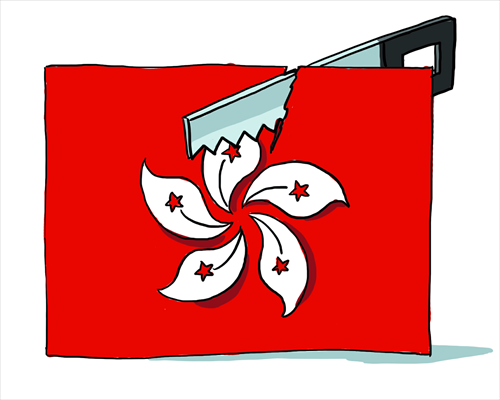HOME >> OP-ED
Demonstrators’ threats put SAR’s reputation at risk
Source:Global Times Published: 2014-3-5 20:23:01

Illustration: Liu Rui/GT
Late last month Hong Kong was replaced by Beijing as the venue for the Asia-Pacific Economic Cooperation (APEC) Finance Ministers' Meeting to be held in September. Officials from APEC interpreted the change of location as a facilitation of logistical arrangements because US President Barack Obama asked for the Economic Leaders' Meeting to be postponed from October to November and therefore the meeting for finance ministers and central bankers will be pushed off for a couple of weeks as well.There is no denying that Beijing is a more ideal place than Hong Kong to host the significant international event as it is easier and more convenient for participants to gather in the capital city. However, this explanation is far from sufficient, because a switch in venue is rare for such an influential international meeting just owing to a minor change in schedule.
Some Hong Kong politicians and scholars associated the switch with the Occupy Central movement, initiated and supported by a pan-democratic group that aims at blocking traffic in Hong Kong's central business districts unless the central government adopts "genuine universal suffrage" in the 2017 chief executive election.
The central government has concerns that the opposition group will take advantage of the international event and disseminate their ideas amid numerous foreign media outlets. This will greatly deteriorate Hong Kong's social environment and probably trigger troubles for the convocation of the meeting.
The pan-democrats have threatened to paralyze the city with a large-scale protest if the government rejects "genuine universal suffrage." The movement has grave consequences, putting Hong Kong's economic and political development in inconceivable jeopardy. What's more, it will damage Hong Kong's reputation in the international community.
A spectrum of pro-independence incidents have taken place in succession, breaking the tranquility of Hong Kong society after the proposal of the Occupy Central campaign.
In December, six faction members holding a flag of the colonial era broke into the People's Liberation Army Hong Kong Garrison.
Then dozens of Hong Kong residents disgruntled with the influx of mainland tourists started an "anti-locust" campaign in mid-February.
Though the majority of Hongkongers love the country and love Hong Kong, the pro-independence force could plunge Hong Kong into an abyss at any time.
Not only the central government, but also the government of the Hong Kong Special Administrative Region and most Hong Kong people, are opposed to the surging pro-independence tendency and must take a hardline stance to contain it.
The central government has been consistent in its policy on Hong Kong's political reform, which is more of a political issue than a legal one. Deng Xiaoping, the late Chinese leader, put forward the idea that Hong Kong must be administered by those who love the country, which serves as the most fundamental requirement of candidates for the chief executive. It is especially true for such an open and liberal society as Hong Kong.
A venue switch for an international meeting, though uncommon, is not a big deal, Some argue that the switch will weaken Hong Kong's position as an international financial center. Cancellation of a single meeting will not reduce foreign investment in the economically active city. And it reminds us that Hong Kong is now confronted with a wide range of intractable quandaries. We must keep high vigilance against the pro-independence force.
The central government has made a wise decision to change the conference venue in case Hong Kong gets mired in a catastrophic demonstration and shrouded in an unfavorable atmosphere for the Finance Ministers' Meeting.
The article was compiled by Global Times reporter Wang Xiaonan based on an interview with Zhang Dinghuai, vice director of the Center for Basic Laws of Hong Kong and Macao Special Administrative Regions, Shenzhen University. wangxiaonan@globaltimes.com.cn
Posted in: Viewpoint